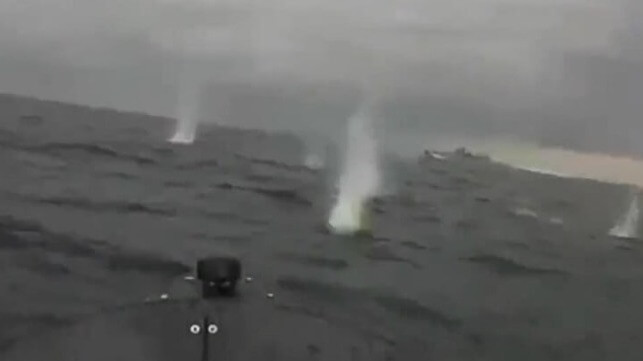Video: Suicide "Drone Boats" Attack Russian Navy's Black Sea Fleet
Russia has withdrawn security guarantees for Ukraine's Black Sea grain shipments in retaliation

Ukrainian forces are believed to be responsible for a successful "suicide boat" strike on at least one Russian Navy warship, potentially including an Admiral Grigorovich-class frigate. The Ukrainian military has not claimed responsibility for the attack.
Video footage appearing to show the drone boats' camera perspectives indicates that the attacks took place near and within the harbor at Sevastopol, the well-guarded home port for the Black Sea Fleet. A similar, uniquely-designed drone boat was found near the same area in September.
The frigate in question is believed to be the Admiral Makarov, the current flagship of the Black Sea Fleet, but details have not been confirmed by either side. Russian frigates and submarines have frequently been used to launch Kalibr cruise missiles at targets in Ukraine.
Very epic footages from today's attack by drones on the Port in Sevastopol, Crimea
— Special Kherson Cat ???????????? (@bayraktar_1love) October 29, 2022
/1 pic.twitter.com/9kDbDBkWPV
Explosions in Sevastopol harbor last night.
— Anton Gerashchenko (@Gerashchenko_en) October 29, 2022
According to some sources, several Russian warships of the Black Sea Fleet were blown up - including a fregate and a landing ship. pic.twitter.com/Q4kCLX8xfq
Russia's Ministry of Defense claims that eight unmanned aerial vehicles and seven unmanned surface vessels (USVs) were involved in the attack, and has reported that the minesweeper Ivan Golubets sustained "minor damage." The ministry further claimed that British forces participated in the attack and in the destruction of the Nord Stream 1 and 2 pipelines - an assertion that Britain's Ministry of Defence has vehemently denied. "This invented story says more about arguments going on inside the Russian Government than it does about the west," said the UK MOD in a statement.
The Kremlin also claimed that the Russian Navy vessels affected by the drone boat attack had been used to provide security for the Black Sea Grain Initiative. Russia has refrained from attacking merchant ships since the initiative started in August, though multiple tankers and bulkers were struck by Russian munitions in the early months of the invasion.
The attack at Sevastopol is not the first setback for the Black Sea Fleet in recent months. Ukrainian forces sank the last Black Sea Fleet flagship, the cruiser Moskva, and badly damaged the Russian-built bridge across the Kerch Strait, impeding Russian Army logistics and degrading a prominent symbol of Russia's territorial ambitions.
Grain initiative suspended
In response to the attack on military targets at Sevastopol, Russia has suspended cooperation with the Black Sea Grain Initiative, withdrawing its promise not to strike merchant ships - and leaving millions of tonnes of Ukrainian grain in limbo. The UN-led Joint Coordination Center for the Black Sea Grain Initiative said Sunday that it is "reviewing recent developments . . . and is discussing next steps."
The Russian Navy enforced a blockade on Ukraine's ports in the early months of the war, and multiple foreign-flag bulkers and tankers were struck by Russian fire during the period. The signing of the joint Turkish/Russian/Ukrainian grain initiative in July raised hopes that these attacks would be left in the past - but Russia's withdrawal from the agreement upends industry expectations for maritime security on the route.
Russia's decision drew broad condemnation from NATO-aligned nations.
"In suspending this arrangement, Russia is again weaponizing food in the war it started, directly impacting low- and middle-income countries and global food prices, and exacerbating already dire humanitarian crises and food insecurity," said Antony Blinken, U.S. Secretary of State, in a statement Sunday. "Any act by Russia to disrupt these critical grain exports is essentially a statement that people and families around the world should pay more for food or go hungry."
Dmytro Kuleba, Ukraine's foreign minister, said that the suspension of the deal strands 176 vessels and two million tonnes of grain - and added that it is not the first Russian action to disrupt the corridor.
"The current queue with grain has accumulated in the Black Sea since September, when Russia started deliberately delaying the functioning of the corridor and seeking to undermine the deal. Russia took the decision to resume its hunger games long ago and now tries to justify it," Kuleba claimed in a statement.
When communicating with the Russian public, some Russian officials have made clear that restrictions on Ukrainian food exports are intended to advance Russia's strategic objectives. In June, top state TV executive Margarita Simonyan told an economic forum that the confidants in her circle "hope for a famine" in order to apply pressure on the West and secure sanctions relief.
“Why is Moscow disrupting the grain deal now? The answer is: Putin needs leverage as things go south for him on the battlefields in Ukraine, so the threat of global food crisis needs to be put back in the Russian toolbox of coercion and blackmail,” Carnegie Endowment senior fellow Alexander Gabuev told the FT.
Shipping set to resume without Russian approval

that matters most
Get the latest maritime news delivered to your inbox daily.
Traffic on the grain corridor shut down Sunday as Turkey, Ukraine and the United Nations discussed options. In an update late in the day, the Grain Initiative JCC said that it plans to inspect 40 outbound vessels in a single day on Monday - more than any previous day in the program's history - with 10 joint Turkish / UN inspection teams, up from five when Russia was participating. "The Russian Federation delegation has been informed," the JCC said in a statement.
In addition, the Turkish, Ukrainian and UN delegations decided to approve the movement of 16 vessels on Monday, including four inbound ships, despite Russia's withdrawal from the program. The UN officials operating the initiative have "informed the delegation of the Russian Federation" of their intent to proceed with movement.
